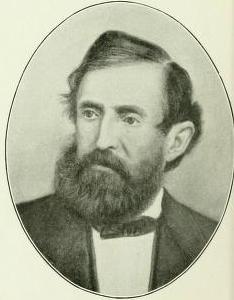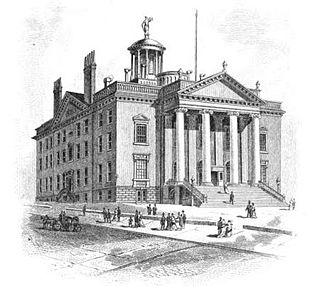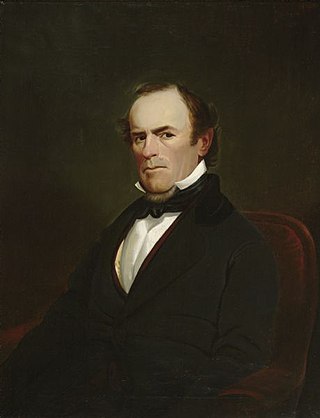Related Research Articles

Peter Buell Porter was an American lawyer, soldier and politician who served as United States Secretary of War from 1828 to 1829.

Lawrence Brainerd was an American businessman, abolitionist and United States Senator from Vermont. A longtime anti-slavery activist, after leaving the Jacksonians in the 1830s, Brainerd was active in the Whig, Liberty, and Free Soil parties, and was one of the organizers of the Republican Party when it was formed as the main anti-slavery party in the mid-1850s. Brainerd's longtime commitment to the cause of abolition was recognized in 1854, when opponents of slavery in the Vermont General Assembly chose him to fill a five-month vacancy in the United States Senate.

Edward Eastman was an American merchant, politician, and pioneer settler of Oshkosh, Wisconsin. He was active in civic and territorial affairs, and known as a Democrat and Free Soiler. In 1847 he was one of a partnership approved by the territorial legislature to build the first bridge across the Fox River in Oshkosh.

William Milnor Roberts was an American civil engineer. Roberts was one of the most prolific and prominent civil engineers of his generation in the United States. As a young civil engineer, he was involved in the construction of the Eads Bridge, held the title of the chief engineer of Northern Pacific Railroad, and was president of the American Society of Civil Engineers scarcely two decades after its founding,

The 50th New York State Legislature, consisting of the New York State Senate and the New York State Assembly, met from January 2 to December 4, 1827, during the third year of DeWitt Clinton's second tenure as Governor of New York, in Albany.

The 51st New York State Legislature, consisting of the New York State Senate and the New York State Assembly, met from January 1 to December 10, 1828, during the fourth year of DeWitt Clinton's second tenure as Governor of New York, and—after Clinton's death—while Nathaniel Pitcher was Governor, in Albany.

John Quincy Adams was an American educator and Republican politician. He served as a member of the Wisconsin State Senate and the Assembly, representing Columbia County.

Robert Bland Sanderson was an American businessman, farmer, rancher and politician from Columbia County, Wisconsin who represented part or all of Columbia County in the Wisconsin State Assembly and the Wisconsin State Senate at various times in the 1860s, before moving to Texas and becoming a prominent businessman in Tom Green County.

Levi Sterling was an American farmer, politician, and Wisconsin pioneer. He was one of the first American settlers at what is now Iowa County, Wisconsin. He served five years in the Wisconsin Legislature and—before Wisconsin achieved statehood—he served three years in the Wisconsin Territorial Assembly. During the American Civil War, he served as a Union Army cavalry officer.

The 97th New York State Legislature, consisting of the New York State Senate and the New York State Assembly, met from January 6 to April 30, 1874, during the second year of John A. Dix's governorship, in Albany.
Orlando Brown was an American farmer from Modena, Wisconsin who spent one year as a member of the Wisconsin State Assembly and two years as a member of the Wisconsin State Senate.
Michael Johnson was an American farmer from Springdale, Wisconsin, who served as a member of the Wisconsin State Assembly from Dane County, as well as holding various local offices.
Samuel Stephen Brannan was an American newspaper editor, Republican politician, and Wisconsin pioneer. He was the 13th mayor of Portage, Wisconsin, and represented northern Columbia County in the Wisconsin State Assembly during the 1873 session.
Henry Cook Mumbrue was an American steamboat operator, businessman, and Wisconsin pioneer. He served in the Wisconsin State Senate (1877–1878) and Assembly (1876), representing Waupaca County. He was at one point the richest resident of Waupaca County, but his riverboat business was wiped out when train lines arrived in the region. His name is often abbreviated as H. C. Mumbrue.
Timothy Hopkins Fellows was an American farmer from Bloomfield, Wisconsin who served on the board of supervisors of Bloomfield and also served two one-year terms (1852–1853) as a Free Soil Party member of the Wisconsin State Assembly from Walworth County.
Austin Kellogg (1814-1895) was a farmer in Concord, Wisconsin, who served three terms as a member of the Wisconsin State Assembly from Jefferson County.

The Ninth Wisconsin Legislature convened from January 9, 1856, to March 31, 1856, in regular session, and re-convened from September 3, 1856, to October 14, 1856.
George McNaught Bartholomew was an American farmer, surveyor, and Wisconsin pioneer. He was one of the founders of Lodi, Wisconsin, and served one term in the Wisconsin State Assembly, representing western Columbia County.
John Jacob Low was an American seaman, hatter, merchant, innkeeper and farmer from Lowville, Wisconsin who served a single one-year term in the Wisconsin State Assembly.
Moses Mitchell Davis was an American physician, Republican politician, and Wisconsin pioneer. He was a member of the Wisconsin Senate, representing Columbia County from 1857 through 1861, and served one term in the Wisconsin State Assembly, in 1856. He was also a regent of the University of Wisconsin, where he was instrumental in passage of a resolution in favor of co-education.
References
- ↑ State of Wisconsin Legislative Reference Bureau. "Members of the Wisconsin Legislature 1848–1999". Information Bulletin 99-1 (September 1999), p. 95
- ↑ The history of Columbia County, Wisconsin, containing an account of its settlement, growth, development and resources; an extensive and minute sketch of its cities, towns and villages--their improvements, industries, manufactories, churches, schools and societies; its war record, biographical sketches, portraits of prominent men and early settlers; the whole preceded by a history of Wisconsin, statistics of the state, and an abstract of its laws and constitution and of the constitution of the United States Chicago: Western Historical Company, 1880; pp. 549, 550, 842, 843-44, 1094-95
- ↑ Turner, A. J., ed. The legislative manual of the state of Wisconsin: comprising the constitution of the United States and of the state of Wisconsin, Jefferson's manual, forms and laws for the regulation of business; also, lists and tables for reference, etc. Twelfth Annual Edition Madison: Atwood and Culver, Printers and Stereotypers, 1873; pp. 451, 463, 466
- ↑ The history of Columbia County... pp. 1094-95
- ↑ "Proceedings of the County Board of Supervisors of Columbia County: Annual Session", Wisconsin State Register December 3, 1881; p. 2, col. 1 via Newspapers.com
- ↑ "Died While She Slept. Death of a Respected Portage Woman.", Portage Daily Register October 27, 1902; p. 4, col. 4